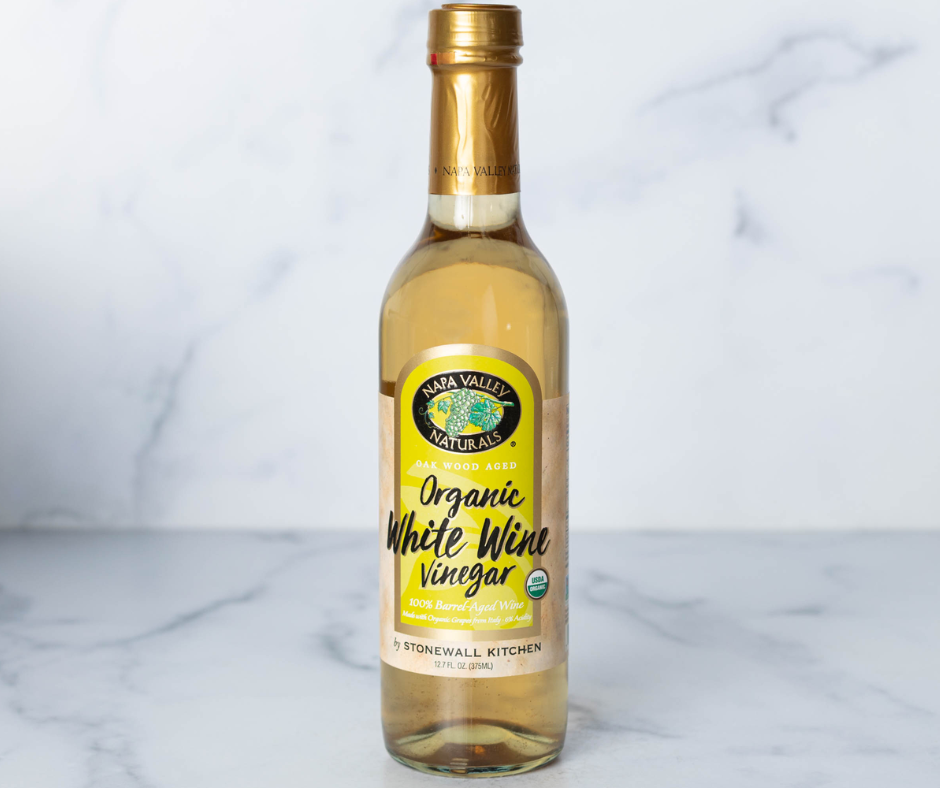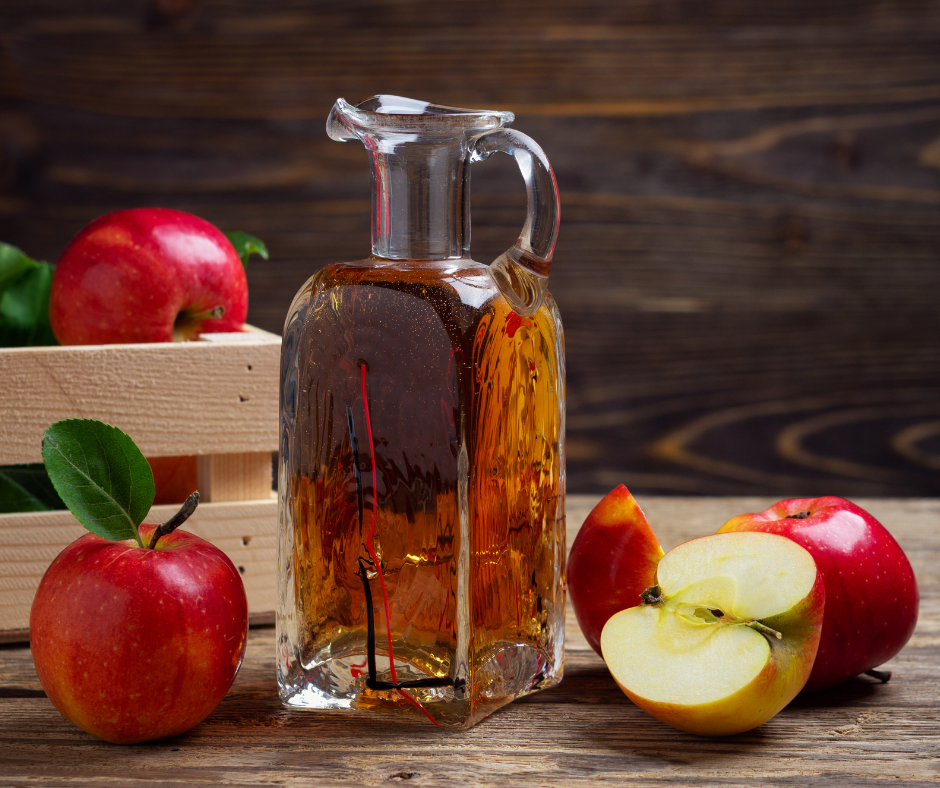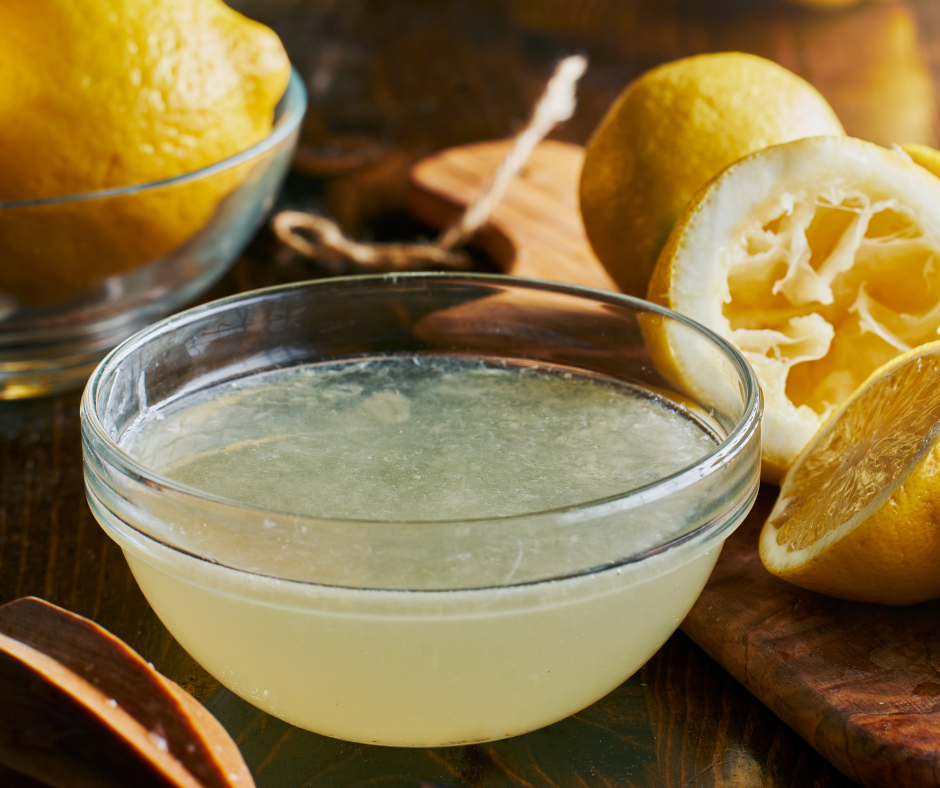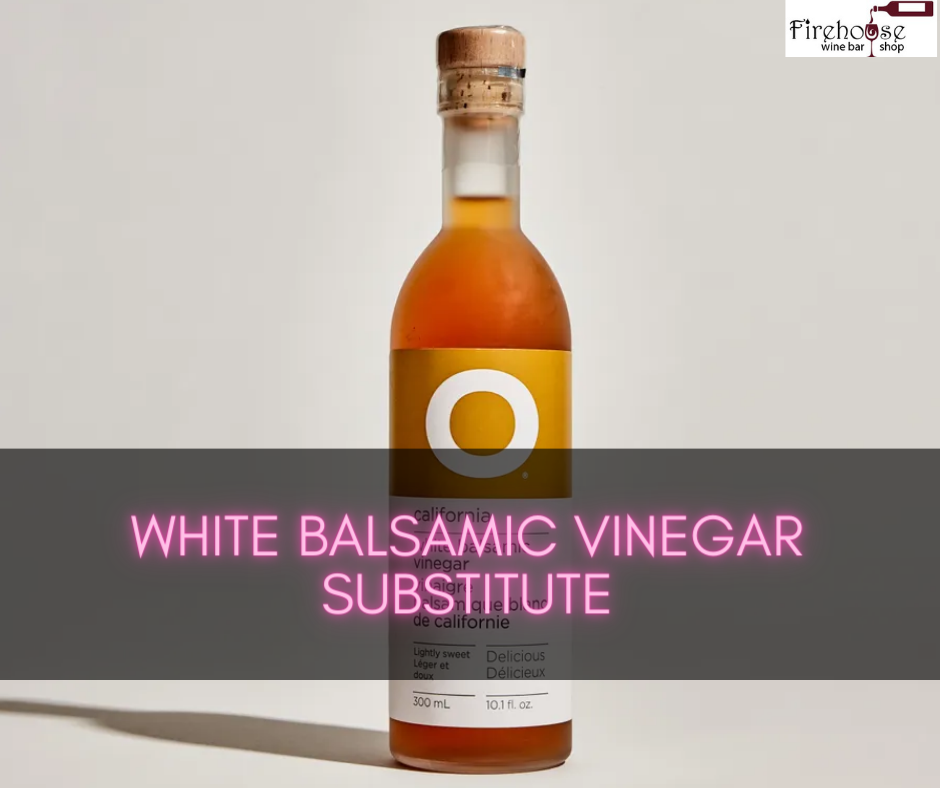Introduction
While white balsamic vinegar can enhance the flavors of many recipes, there are instances when you might want to explore other options. Perhaps you ran out of white balsamic vinegar and need a substitute, or maybe you prefer to try something different to add a new twist to your dishes.
Another reason to consider alternatives is that white balsamic vinegar might be unavailable in certain areas or grocery stores. Knowing what options can be used as a replacement without compromising the overall taste and quality of your culinary creations is helpful. This blog will help you explore other options to choose a White Balsamic Vinegar Substitute.
Overview Of White Balsamic Vinegar And Its Uses
White balsamic vinegar is a tangy and slightly sweet vinegar that uniquely flavors various dishes. It is made from white wine and grape must, giving it a lighter color and milder taste than traditional balsamic vinegar.
This versatile vinegar can be used in several ways, such as in salad dressings, marinades for meat and vegetables, and sauces for pasta or roasted dishes. Its delicate balance of acidity and sweetness makes it a popular choice among chefs and home cooks.
Potential White Balsamic Vinegar Substitute
- White wine vinegar: White wine vinegar is another excellent alternative to balsamic vinegar. It stands out due to its unique flavor profile, bringing a delicate balance of acidity and sweetness to recipes. To replicate the sweetness of balsamic vinegar, consider adding honey, maple syrup, or granulated sugar to white wine vinegar.
- Apple cider vinegar: Its slightly fruity and tangy taste can be a suitable substitute in certain recipes. It provides a similar level of acidity to white balsamic vinegar and can add a subtle hint of sweetness.
- Rice vinegar: Rice vinegar, also known as rice wine vinegar, has a mild and slightly sweet taste. It is commonly used in Asian cuisine and can be a good alternative when white balsamic vinegar is unavailable.
- Lemon or lime juice: If you want a citrusy flavor to replace the tanginess of white balsamic vinegar, lemon or lime juice can be used. These acidic juices can bring a refreshing twist to your dishes.
- Red wine vinegar: Although it has a stronger flavor than white balsamic vinegar, it can be used as a substitute if you enjoy a more robust taste. It pairs well with meat dishes and can add a rich depth of flavor.
When using these alternatives in your cooking, remember that the flavor profiles may not be identical to white balsamic vinegar. However, they provide enjoyable and distinctive twists to dishes and may suit certain recipes better than traditional balsamic vinegar.

White Balsamic Vinegar Substitute
Exploring The Versatility Of White Balsamic Vinegar
White balsamic vinegar is popular in many recipes due to its light flavor and mild acidity. However, there may be occasions when you need to find a White Balsamic Vinegar Substitute. Fortunately, a few alternatives can mimic its characteristics and enhance your dishes.
One such alternative is white wine vinegar. Like white balsamic vinegar, white wine vinegar offers a delicate flavor profile and a tangy acidity. It can be used interchangeably in dressings, marinades, and sauces, providing similar brightness and acidity to your dishes.
Another option is apple cider vinegar, which has a slightly milder flavor and a hint of sweetness. While it may not be as subtle as white balsamic vinegar, apple cider vinegar can still contribute to a well-balanced dressing or marinade. Remember that it might alter the flavor profile slightly, so adjust the quantities accordingly.
Rice vinegar is another suitable alternative to white balsamic vinegar, especially in Asian cuisine. It has a lighter and cleaner taste, comparable to the mild flavor of white balsamic vinegar. Rice vinegar works well in dressings and marinades and can add a unique twist to your dishes.
Tips For Substituting White Balsamic Vinegar In Dishes
When substituting white balsamic vinegar, it’s crucial to consider the overall flavor profile of the recipe. Each alternative may have its distinct taste, so choose the one that complements the other ingredients. For sweeter dishes, apple cider vinegar might be the best option, while rice vinegar can enhance the flavors of Asian-inspired recipes.
Remember, experimentation is key in finding the perfect White Balsamic Vinegar Substitute. Don’t be afraid to try different alternatives and adjust the quantities until you achieve the desired taste in your dishes.
In conclusion, while white balsamic vinegar is a fantastic ingredient, several alternatives can mimic its qualities. Whether it’s white wine vinegar, apple cider vinegar, or rice vinegar, these alternatives provide a similar acidity and flavor, allowing you to create delicious and well-balanced dishes.
Apple Cider Vinegar
Benefits Of Using Apple Cider Vinegar As An Alternative
Apple cider vinegar can be an excellent White Balsamic Vinegar Substitute due to its similar level of acidity and subtle sweetness. It offers several health benefits and can enhance the flavors of your dishes in unique ways. Here are some of the advantages of using apple cider vinegar as an alternative:
- Health Benefits: Apple cider vinegar has various health benefits, including improved digestion, reduced blood sugar levels, and weight loss support. It is also believed to have antimicrobial properties and can aid in maintaining a healthy gut.
- Versatile Flavor Profile: The slightly fruity and tangy taste of apple cider vinegar can add depth and complexity to your recipes. It pairs well with sweet and savory ingredients, making it a versatile option for various dishes.
- Subtle Sweetness: Like white balsamic vinegar, apple cider vinegar has a hint of sweetness that can balance out the acidity. This sweetness can enhance the overall flavor of your recipes without overwhelming the other ingredients.
How To Substitute With Apple Cider Vinegar
- Salad Dressings and Marinades: When making salad dressings or marinades that call for white balsamic vinegar, you can easily replace them with apple cider vinegar. Start by using the same amount of apple cider vinegar as the recipe suggests for white balsamic vinegar. Adjust the sweetness by adding a touch of honey, maple syrup, or granulated sugar, if desired.
- Sauces and Glazes: Apple cider vinegar can add a tangy and slightly sweet note to sauces and glazes. Use it as a substitute in recipes that require white balsamic vinegar, and adjust the sweetness and acidity according to your taste preferences.
- Pickling: If you want to pickle vegetables or fruits and need an alternative to white balsamic vinegar, apple cider vinegar can work well. Its mild acidity and subtle sweetness can complement the flavors of the ingredients being pickled.
Remember that apple cider vinegar has a distinct flavor profile, so the final result may not be identical to white balsamic vinegar. However, it can still provide a delicious and unique twist to your dishes while maintaining a similar level of acidity. Experiment with different ratios and ingredients to find the perfect substitution for your culinary creations.

Rice Wine Vinegar
Characteristics And Flavor Profile Of Rice Wine Vinegar
Rice wine vinegar, also known as rice vinegar, is a versatile White Balsamic Vinegar Substitute. It has a mild acidity and subtle sweetness that mimics the flavor profile of white balsamic vinegar. Made from fermented rice wine, rice vinegar is a staple in many Asian cuisines and can be found in white and red varieties.
Rice wine vinegar has a delicate and clean taste, slightly sweet and tangy. It is less acidic than other vinegar types, making it a popular choice for those who prefer a milder taste. The flavor profile of rice vinegar pairs well with various dishes, from dressings and marinades to sauces and pickled vegetables.
Creative Ways To Incorporate Rice Wine Vinegar Into Recipes
Rice wine vinegar can be used as a White Balsamic Vinegar Substitute in many recipes. Here are some creative ways to incorporate it into your culinary creations:
- Salad Dressings: Create a refreshing and tangy salad dressing by combining rice wine vinegar with a neutral oil, such as vegetable or grapeseed. Add a pinch of salt and sweetness, like honey or agave syrup, to balance the flavors.
- Marinades: Use rice wine vinegar as a base for marinades, especially for Asian-inspired dishes. Combine it with soy sauce, garlic, ginger, and a sweetener like brown sugar or honey for a flavorful and tenderizing marinade.
- Sauces and Glazes: Add depth and complexity to your sauces and glazes by incorporating rice wine vinegar. Its mild acidity can cut through richness and add a subtle tanginess to dishes like stir-fries, braises, and barbecue sauces.
- Pickling: Rice wine vinegar is a great alternative to white balsamic vinegar for pickling vegetables. Its subtle sweetness and mild acidity enhance the flavors of the ingredients while preserving them.
By experimenting with rice wine vinegar in your recipes, you can maintain the appearance and taste of your dishes while providing a unique twist. Whether you’re making salad dressings, marinades, sauces, or pickles, rice wine vinegar is a versatile substitute that can elevate your culinary creations.
Lemon Juice
Benefits Of Using Lemon Juice As An Alternative To White Balsamic Vinegar
Lemon juice is a versatile ingredient that can be used as a White Balsamic Vinegar Substitute in various dishes. It offers a range of benefits that make it an excellent alternative option.
First and foremost, lemon juice adds brightness and acidity to recipes, similar to the tangy flavor of white balsamic vinegar. This refreshing citrus juice can uplift the flavors of your dishes, providing a zesty and vibrant note. It pairs particularly well with salads, seafood, and grilled vegetables, enhancing their natural flavors.
In addition, lemon juice brings a subtle sweetness to the table. When mixed with a touch of agave nectar or honey, it creates a balanced and slightly sweeter flavor profile reminiscent of white balsamic vinegar. This combination adds complexity to dressings, marinades, and sauces, creating a well-rounded taste experience.
Moreover, lemon juice is readily available in most kitchens, making it a convenient alternative to white balsamic vinegar. Whether you have fresh lemons or bottled lemon juice, you can easily incorporate it into your recipes without needing a special trip to the store.
Adding Brightness And Acidity To Recipes With Lemon Juice
Lemon juice, with its bright acidity, can bring a refreshing tang to your dishes. It works as a finishing touch for salads, where a drizzle of lemon juice can enliven the greens and complement the other ingredients. The citrusy notes of lemon juice can also brighten the flavors of grilled vegetables, adding freshness to your plate.
In addition to salads and vegetables, lemon juice can be used in other recipes. It can be valuable in dressings, marinades, and sauces, providing a tangy kick and balancing the overall flavors. Whether preparing a zesty lemon vinaigrette or a tangy marinade for poultry or fish, lemon juice can be a versatile White Balsamic Vinegar Substitute.
Lemon juice is a versatile and easily accessible alternative to white balsamic vinegar. Its bright acidity, subtle sweetness, and ability to enhance the flavors of various dishes make it a valuable ingredient in your culinary arsenal. So, don’t hesitate to reach for a lemon and explore its potential as a substitute in your recipes.

White Grape Juice
Exploring The Sweetness Of White Grape Juice
One of the best alternatives to white balsamic vinegar is white grape juice. This sweet and fruity juice brings a unique flavor profile to recipes, making it an excellent substitute for those looking for a milder and sweeter taste. White grape juice offers a delicate balance of sweetness and acidity, which can enhance the flavors of various dishes.
White grape juice is made from white grapes, giving it a naturally sweet taste. This sweetness can add depth and complexity to dressings, marinades, and sauces, similar to white balsamic vinegar. By using white grape juice, you can achieve a similar flavor profile without the tartness of vinegar.
Recipes And Uses For Substituting White Balsamic Vinegar With White Grape Juice
White grape juice can be used as a White Balsamic Vinegar Substitute in many recipes. Here are a few ideas to get you started:
- Salad dressings: Mix white grape juice with olive oil, lemon juice, and your favorite herbs for a refreshing and flavorful dressing. The juice’s sweetness will balance the acidity, creating a well-rounded taste.
- Marinades: Combine white grape juice with garlic, soy sauce, and spices to create a marinade for meats or vegetables. The juice will help tenderize the ingredients while infusing them with a hint of sweetness.
- Glazes: Use white grape juice as a base for glazes for roasted meats or grilled vegetables. The natural sugars in the juice will caramelize and create a glossy and flavorful coating.
- Reductions: Like white balsamic vinegar, white grape juice can be reduced to create a thick and syrupy glaze. Use it to drizzle over fruits, desserts, or even savory dishes for added sweetness and depth of flavor.
So, the next time you find yourself without white balsamic vinegar, don’t worry. Reach for a bottle of white grape juice and discover its versatility in adding a touch of sweetness to your favorite recipes.
Yogurt Or Sour Cream
Utilizing The Creaminess And Tang Of Yogurt Or Sour Cream As Alternatives
If you need an alternative to white balsamic vinegar, look no further than the creaminess and tang of yogurt or sour cream. These dairy-based ingredients can provide a similar texture and flavor profile, making them excellent substitutes for those who are dairy-free or simply looking for a different taste.
Yogurt and sour cream add a rich and creamy element to dishes, which can help balance out the flavors and enhance the overall taste. The tanginess of these ingredients also adds a subtle acidity that can mimic the tartness of white balsamic vinegar.
Incorporating Yogurt Or Sour Cream In Salad Dressings And Sauces
The possibilities are endless when it comes to using yogurt or sour cream as alternatives to white balsamic vinegar. One popular option is to incorporate them into homemade salad dressings. By combining yogurt or sour cream with olive oil, herbs, and a squeeze of lemon juice, you can create a creamy and flavorful dressing that complements a variety of salads. This alternative is especially useful for dairy-free people who cannot consume yogurt.
Yogurt or sour cream can also be used in sauces and marinades. Their creamy texture can help thicken and bind the ingredients together, adding a tangy and slightly tart taste. Whether making a creamy salad dressing, a tangy dip, or a flavorful marinade, yogurt or sour cream can be a versatile and delicious White Balsamic Vinegar Substitute.
In conclusion, if you are without white balsamic vinegar, consider yogurt or sour cream as an alternative. These dairy-based ingredients can add creaminess, tang, and subtle acidity to your dishes, creating a similar flavor profile to white balsamic vinegar. Whether you’re making a salad dressing, a sauce, or a marinade, yogurt or sour cream can provide a delightful twist to your recipes.
Conclusion
Now you should know about the White Balsamic Vinegar Substitute. If you find yourself without white balsamic vinegar, several alternatives can provide a similar flavor profile and enhance the overall taste of your dishes. The five best substitutes for white balsamic vinegar include balsamic vinegar, white wine vinegar, rice wine vinegar, Chinese black vinegar, and red wine vinegar.
Summary Of White Balsamic Vinegar Substitute
- Balsamic Vinegar: This dark, thick vinegar with a sweet and complex flavor is often used as a finishing touch to dishes. It can be drizzled over salads, grilled meats, or fresh fruits. Balsamic vinegar can also be used in cooking.
- White Wine Vinegar: This vinegar is made from fermented white wine and is slightly less acidic than white balsamic vinegar. It can be used in dressings, marinades, and sauces.
- Rice Wine Vinegar: Rice wine vinegar is commonly used in Asian cuisine and has a mild and slightly sweet flavor. It can be used in salad dressings, stir-fries, and pickling recipes.
- Chinese Black Vinegar: This vinegar is made from fermented rice and has a complex flavor with hints of smokiness. It is commonly used in Chinese cuisine and sauces, marinades, and dipping.
- Red Wine Vinegar: Red wine vinegar is more acidic than white balsamic vinegar, so you may need to adjust the amount you use to suit your taste. It can be used in dressings, marinades, and sauces.
Choosing The Best Alternative For Your Needs
When choosing the best alternative for white balsamic vinegar, consider the flavor profile you’re looking for and the specific dish you’re making. Balsamic vinegar and white wine vinegar are versatile options that can be used in various recipes. Rice wine and Chinese black vinegar add a unique Asian flair to dishes. Red wine vinegar provides a tangy and slightly acidic taste.
Experiment with different substitutes to find the one that best complements your dish. Remember that the acidity levels may vary, so adjust the amount used accordingly. Whether drizzling it over a salad or using it in a marinade, these alternatives can help you achieve the desired flavor and enhance your culinary creations.
In summary, White Balsamic Vinegar Substitute offers versatility and a range of flavors to elevate your dishes. Enjoy the exploration and experimentation as you discover new tastes and enhance your cooking repertoire.
FAQ
Q: What can I use as a substitute for white balsamic vinegar in recipes?
A: You can use white wine vinegar or rice wine vinegar as a substitute for white balsamic vinegar.
Q: Will substituting white wine vinegar or rice wine vinegar change the color of my recipe?
A: No, using white wine vinegar or rice wine vinegar as a substitute for white balsamic vinegar will not change the color of your recipe.
Q: Can I use regular balsamic vinegar as a substitute for white balsamic vinegar?
A: While regular balsamic vinegar may work as a substitute, it will change the flavor and color of your recipe.
Q: What if I want a different flavor profile than white balsamic vinegar?
A: Sherry vinegar can be used as a substitute for white balsamic vinegar for a different flavor profile. However, be aware that sherry vinegar has a robust, earthy, and slightly sweet flavor compared to the lighter, brighter taste of white balsamic vinegar.
Q: Is there a guide to substituting different types of vinegar in recipes?
A: Yes, there are many guides available online that provide substitutes for different types of vinegar in cooking, pickling, fermenting, or making salad dressings.

Andre Lotz immigrated to the United States from South Africa almost 20 years ago. Still, he didn’t feel truly at home until he settled in Mobile—a city that reminds him of his childhood home of Fish Hoek on the southern cape of Africa.

